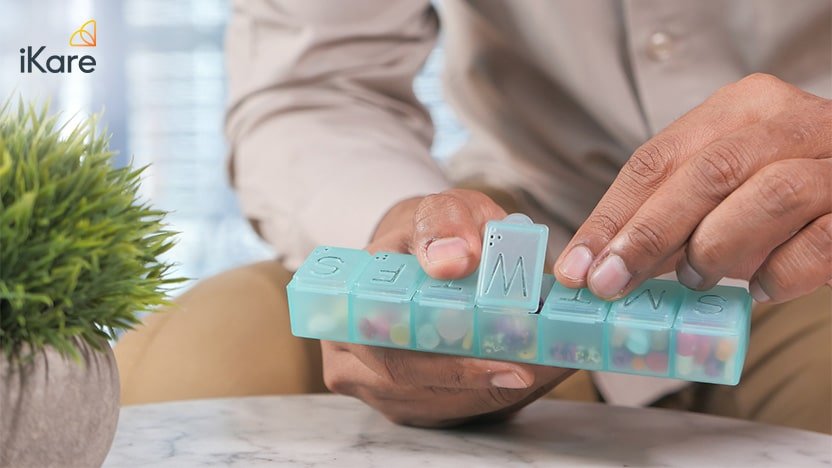
Medication management is a crucial aspect for the elderly as they often need to take multiple medications to address various health issues as they age. However, managing multiple medications can be complex and challenging, leading to potential risks such as medication errors, adverse reactions, or missed doses. iKare, an established provider of home care services in Singapore has compiled several ways to improve medication management for seniors. Keep reading to learn more about this important topic.

Use pill boxes
One effective way to simplify medication management for the elderly is by using pill boxes. These containers are designed with compartments for each day of the week and often include multiple time slots for morning, noon, evening, and bedtime doses. Pill boxes can also be pre-filled by those providing caregiver services or loved ones, making it more convenient for the elderly individual.
The choice of a pill box should align with the individual’s needs and preferences. When selecting a pill box, factors to consider include the number of medications, user-friendliness, and, especially in the case of individuals with conditions like arthritis or dementia, their ability to access and open the compartments.
Pill boxes come in various types, including simple daily containers, weekly organisers with multiple compartments per day, and even automated dispensers with alarms or reminders. By organising medications in pill boxes, seniors and their caregivers can easily see what needs to be taken when, reducing the risk of missed doses or accidental overdoses.
Label medications clearly
As a person’s medication regimen becomes more complex, it’s essential to have a well-organised and clearly labelled system to avoid confusion and medication mix-ups. Labels should include the medication name, dosage instructions such as “take with food” and possibly visual aids such as symbols or images depicting day or night, enhancing clarity and ensuring proper adherence to the regimen.
To create clear labels, you can use a label maker or adhesive labels that adhere securely to the medication packaging. It’s important to replace labels if they become damaged or faded, ensuring that the information remains legible. In addition, consider colour-coding labels for different types of medications to make identification even easier.

Seek help from a professional caregiver
Sometimes, despite the best efforts of family members and individuals themselves, medication management may still be a daunting task. In such cases, seeking help from professional caregiver services can provide valuable support and peace of mind. Professional caregivers have undergone comprehensive caregiver training and possess the expertise required to help the elderly effectively and safely manage their medications.
This is especially important for individuals with dementia. Caregivers can manage medication administration, ensuring the right doses are taken as scheduled, ensuring that the correct doses are taken at the designated times. Additionally, they can keep a watchful eye for any potential side effects or adverse reactions, promptly communicating any concerns.
Learn more: How a Dementia Journal Makes Caregiving Easier
To ensure the safety and well-being of the elderly, it’s essential to employ effective strategies that simplify the process and minimise the risk of errors. By doing so, we can empower seniors to maintain their health and well-being while enjoying the peace of mind that comes with efficient medication management. Furthermore, employing modern solutions such as mobile applications to remind individuals of medication timings can significantly bolster this effort. These apps serve as invaluable tools, offering timely reminders and simplifying the medication routine, thereby contributing to the overall well-being of seniors.
Whether you’re looking for dementia caregivers or comprehensive home care services, iKare offers a wide range of solutions to provide essential support for your loved ones. Get in touch with us to find out more today
